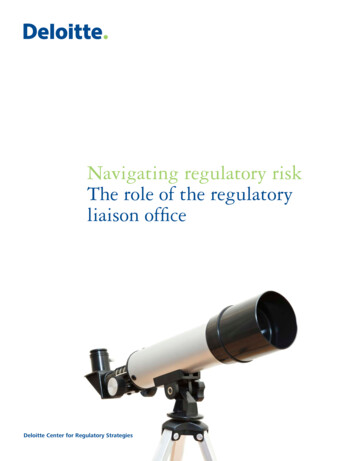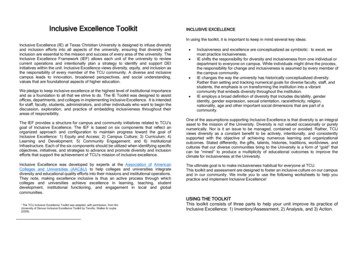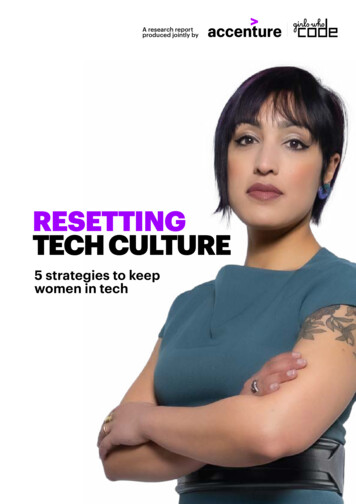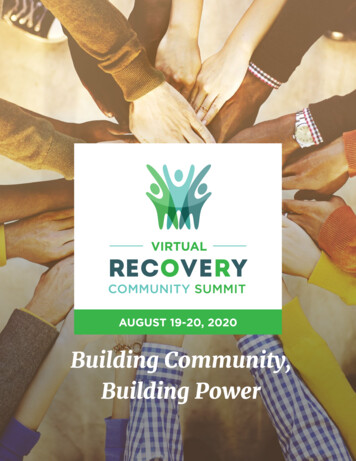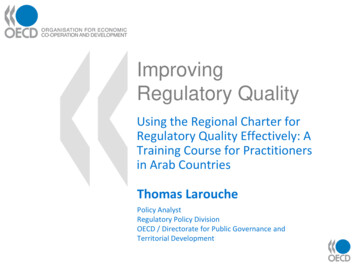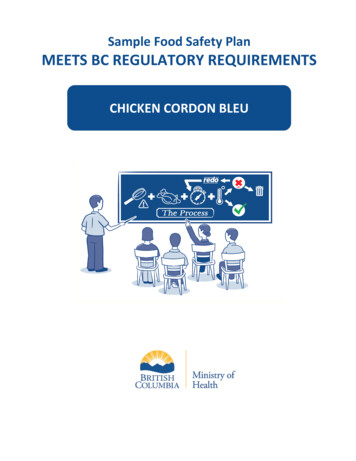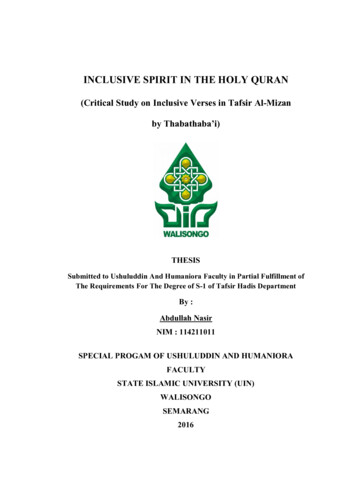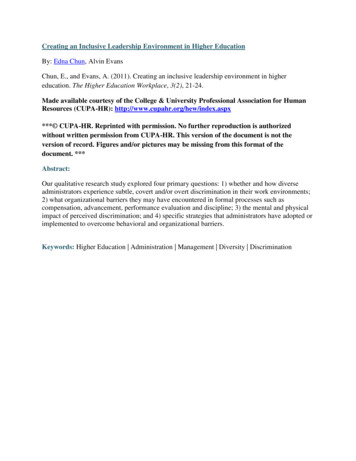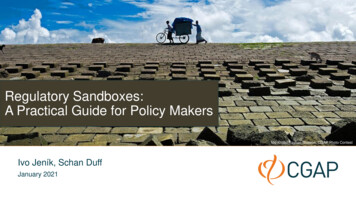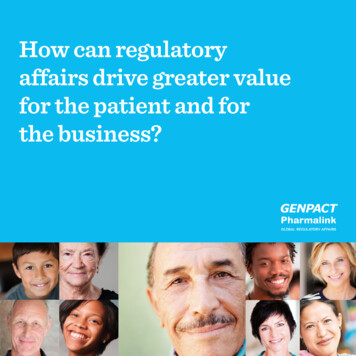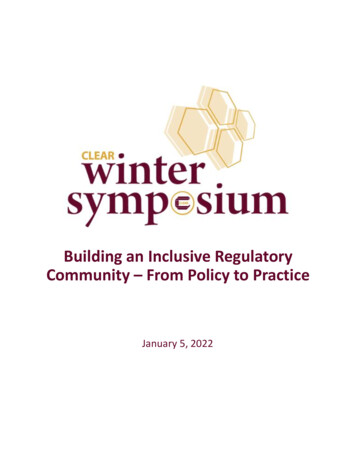
Transcription
Building an Inclusive RegulatoryCommunity – From Policy to PracticeJanuary 5, 2022
AgendaAll Times are in Eastern Standard TimeJanuary 5, 202210:00 AM – 10:10 AMWelcome and Introductions10:10 AM – 11:10 AMMoving the Needle: Promoting Equity and Inclusion withinMichigan’s Regulatory CommunityMarlon I. Brown, Chief Administrative OfficerMichigan Department of Licensing and Regulatory Affairs11:10 AM – 11:20 AMBreak11:20 AM – 12:20 PMDisability Inclusion and Access: Removing Barriers to Open Jobs forAmericans with DisabilitiesPhilip Kahn-Pauli, Policy and Practices DirectorRespectAbility12:20 PM – 1:20 PMLunch Break1:20 PM – 2:20 PMA Few Good Facts about Occupational Licensing that matter forRegulatorsDr. Peter Q. Blair, Assistant ProfessorHarvard University, Graduate School of Education2:20 PM – 3:20 PMBarriers to Workforce DevelopmentLindsey Courtney, Executive DirectorNew Hampshire Office of Professional Licensure and CertificationAlbert Scherr, Professor and ChairUniversity of New Hampshire School of Law3:20 PM – 3:30 PMBreak3:30 PM – 4:30 PMCritical Insights for Regulators from Equity-Centered CannabisPolicy Reform & ImplementationDasheeda Dawson, ChairCannabis Regulators of Color Coalition (CRCC)4:30 PM – 5:00 PMClosing Remarks1
SessionsMoving the Needle: Promoting Equity and Inclusion within Michigan’sRegulatory CommunityMarlon I. BrownChief Administrative Officer, Michigan Department of Licensing and Regulatory AffairsUnder the leadership of Governor Gretchen Whitmer and Director Orlene Hawks, the MichiganDepartment of Licensing and Regulatory Affairs (LARA) has made diversity, equity, and inclusion (DEI) afocal point of its work. LARA recently adopted administrative rules requiring implicit bias training as acondition of licensure for all health professionals in the state. Similarly, the department is leading byexample in having all its staff complete implicit bias training. LARA has further demonstrated acommitment to this work by hiring its first equity and inclusion officer. These initiatives, and others,are purposed to foster greater engagement and awareness around DEI issues. This presentation willprovide an overview of LARA’s ongoing efforts and share what the department has learned as it strivesto promote equity and inclusion within Michigan’s regulatory community.Disability Inclusion and Access: Removing Barriers to Open Jobs forAmericans with DisabilitiesPhilip Kahn-PauliPolicy and Practices Directory, RespectAbilityThe past 23 months of the COVID-19 pandemic have seriously impacted the more than 67 millionAmericans living with some form of disability. However, there are new signs of hope and opportunity.According to the Bureau of Labor Statistics, the labor force participation rate for working-age peoplewith disabilities is now at 37.7 percent. This number is fully 2 percentage points higher than it wasbefore the pandemic started, meaning that more than a million people with disabilities got jobs orstarted a business! To sustain this momentum, public and private sector leaders need to cometogether in order to remove regulatory barriers to employment, invest in cost-effective programs, andreplicate best practices. This session will discuss practical strategies and proven models for gettingmore qualified individuals into the workforce.2
SessionsA Few Good Facts about Occupational Licensing that matter for RegulatorsDr. Peter Q. BlairAssistant Professor, Graduate School of Education, Harvard UniversityOccupational Licensing touches 1 in 4 workers in both the US and Europe. As policy makers considerreforming licensing there a few key facts that are important for understanding the trade-offs inherentin licensing reform.Barriers to Workforce DevelopmentLindsey CourtneyExecutive Director, New Hampshire Office of Professional Licensure and CertificationAlbert ScherrProfessor and Chair, University of New Hampshire School of LawWho is entitled to pursue a profession? Individuals who meet education and experience requirementsare generally competent—however, what other grounds should regulators consider in evaluating alicensure application? Should there be limits on a regulator’s ability to deny licensure based on pastcriminal history?In New Hampshire, the right to pursue an occupation is a fundamental right—but that was not alwaysthe case. This session explores the movement that changed New Hampshire’s approach to review ofcriminal convictions in the licensure process and the necessary statutory and regulatory changes. Thissession also highlights “lessons learned” and the challenges in implementation. Finally, this sessiondiscusses additional efforts to remove unnecessary barriers to workforce and some strategies forregulators to consider in revising their approach to criminal history and good moral characterrequirements.3
SessionsCritical Insights for Regulators from Equity-Centered Cannabis PolicyReform & ImplementationDasheeda DawsonChair, Cannabis Regulators of Color CoalitionCannabis Regulators of Color Coalition (CRCC) is a coalition of government officials appointed and/orselected to lead, manage and oversee the regulatory and policy implementation for legal medical andadult-use cannabis markets across the United States and abroad. CRCC founding members representmultiple legal cannabis jurisdictions from across the country, including California, Massachusetts,Illinois, Oregon, Connecticut and Oklahoma. Called the leading architects of cannabis equity and policyreform in the United States, the coalition's mission is to be a source of information and education forlegislators that aim to build sustainable cannabis regulatory frameworks that are also designed todeliver on the reparative and restorative potential of the global cannabis legalization anddecriminalization movement.As public servants responsible for advising and implementing cannabis policy reform at the state andmunicipal level, CRCC members know firsthand that many state and municipal governments areincreasingly making the commitment to not only responsibly license and regulate commercialcannabis activity, but to also pioneer and collaborate on the development of innovative regulatoryprograms that seek to acknowledge and remediate the harms from past government laws. Over thelast several years, and certainly in the last twelve months, legal states have made significant progressin elevating the need to center equity in cannabis policy reform. This is evidenced through recent stateand local efforts to decriminalize and legalize cannabis, and the establishment of cannabis equityprograms, community reinvestment initiatives and the development of strategies specificallyaddressing racial inequities in policy reform. Many of these efforts have happened within therespective jurisdictions under the direct leadership of founding members of the CRCC. This session willshare critical insights from the collective experience of CRCC members while also discussingopportunities for equity-centered regulation in other sectors.4
PresentersMarlon I. BrownChief Administrative Officer, Michigan Department of Licensing andRegulatory AffairsMarlon I. Brown works for the State of Michigan as the Chief AdministrativeOfficer for the Department of Licensing and Regulatory Affairs (LARA). He isresponsible for leading the central services of the department includingcommunications, finance and administration, human resources, policy andlegislative affairs, and equity and inclusion initiatives. Marlon most recentlyserved as director of LARA's Office of Policy and Legislative Affairs where heled the development of a transformative policy requiring all health careprofessionals in Michigan to receive training on implicit bias and the way itaffects the delivery of health care services. Marlon has served in variouspositions within state government, including working for the MichiganSupreme Court, the Michigan Department of Transportation, and the StateBudget Office. He earned a BA in political science from American University, aMaster of Public Administration from the University of Delaware, and he iscurrently pursuing a doctorate in public administration at Valdosta StateUniversity.Philip Kahn-PauliPolicy and Practices Director, RespectAbilityPhilip Kahn-Pauli is the Policy and Practices Director of RespectAbility, anonprofit organization fighting stigmas and advancing opportunities so peoplewith disabilities can fully participate in all aspects of the community. Heeducates leaders at the federal and state level about best practices to expandopportunities for people with disabilities. He frequently organizes accessiblewebinars on best practices, which are attended by workforce boards,agencies, VR, disability organizations, public officials, artists, and more –reaching a national audience of more than 2,000. Kahn-Pauli also speaks atnational and regional conferences for workforce boards, agencies, andprofessionals.At the state level, Kahn-Pauli advocates for cost-effective solutions, replicablemodels, and school-to-work transition programs for youth with disabilities.Kahn-Pauli’s career in disability began with several years of work at a localnonprofit focused on traumatic brain injury. He holds a master’s degree insocial policy and philosophy from George Washington University and abachelor’s degree from the University of Denver. Raised by a single motherwith serious chronic health issues, he is deeply committed to building a betterfuture for people with disabilities.5
PresentersDr. Peter Q. BlairAssistant Professor, Graduate School of Education, Harvard UniversityDr. Peter Q. Blair is on the faculty in the Graduate School of Education atHarvard University where he co-directs the Project on Workforce. He servesas a Faculty Research Fellow of the National Bureau of Economic Research(NBER) and the Principal Investigator of the BE-Lab – a research group withpartners from Harvard, Clemson, and Illinois Urbana-Champaign. His group’sresearch focuses on the link between the future of work and the future ofeducation, labor market discrimination, occupational licensing, and residentialsegregation. Dr. Blair received his Ph.D. in Applied Economics from theWharton School at the University of Pennsylvania, his M.Sc. in TheoreticalPhysics from Harvard University, and his B.Sc. in Physics and Mathematicsfrom Duke University. He is the youngest of his parents’ seven sons, and gothis start understanding markets by selling fruit and vegetables in the Bahamasin the Nassau Straw Market with his brothers.Lindsey CourtneyExecutive Director, New Hampshire Office of Professional Licensureand CertificationLindsey B. Courtney is currently the Executive Director of the New HampshireOffice of Professional Licensure and Certification, the state agency responsiblefor administering occupational licensing boards in New Hampshire. Lindseyattended Northeastern University and thereafter New England School of Law,where she was a recipient of the Sandra Day O’Connor Award. Lindsey’s lawcareer began at a leading medical malpractice law firm in New Hampshire,before she joined the New Hampshire Department of Justice as litigationcounsel to the Department of Health and Human Services. Lindsey has servedon the Board of Directors of the New Hampshire Women’s Bar Associationsince 2014 and is presently the NHWBA Vice President. She is co-founder ofthe NHWBA Women to Women Project, designed to unite women attorneyswith female inmates at the New Hampshire State Prison for Women for thepurpose of providing general legal information to assist in transitioning to thecommunity. Lindsey has been an active member of several associations,including most recently as representative to the American Association ofHealth and Human Services Attorneys. Lindsey has been a change agent atOPLC since her arrival in 2019, leading a restructuring of the new agency witha focus on eliminating unnecessary barriers to workforce, reducinginefficiencies in the licensing process, and improving the licensee experience.6
PresentersAlbert ScherrProfessor and Chair, University of New Hampshire School of LawProfessor Scherr is a nationally recognized authority on forensic DNA evidenceand genetic privacy. He is a past president of the New Hampshire CivilLiberties Union, and a former member of the ACLU’s national Board ofDirectors. Professor Scherr has also worked closely as a cooperating attorneyfor the ACLU-NH on a number of issues involving economic justice in thecriminal justice system. He has lectured and taught on criminal law and ongenetic privacy issues across the country to judges, lawyers and graduate andundergraduate students. He consults regularly with NH legislators on criminaljustice reform and privacy issues.Dasheeda DawsonChair, Cannabis Regulators of Color CoalitionDasheeda Dawson is a global cannabis advocate, award-winning Fortune 100business strategist and bestselling author of How to Succeed in the CannabisIndustry featured across multiple outlets including Entrepreneur, The NewYork Times, and Essence. She has nearly 20 years of business development,strategic management and brand marketing excellence while leadingtransformative businesses for philanthropic and for-profit corporations. Forover five years, she has worked as a cannabis-focused educator, seniorexecutive leader, and strategy expert for multiple businesses, municipalities,and media outlets across the country. Currently, Dasheeda is the City ofPortland Cannabis Program Manager for the Office of Community & Civic Life,responsible for overseeing all regulatory, licensing, compliance and equityinitiatives for the city’s cannabis industry. Supported by ongoing cannabis taxrevenue allocation, her office oversees the Social Equity & EducationalDevelopment (SEED) Initiatives which includes the nationally-modeled SEEDGrant Fund, the country’s first community reinvestment fund tied to cannabistax revenue. Under her leadership, Portland recently approved a multimilliondollar Cannabis Emergency Relief Fund (CERF) becoming the first governmentjurisdiction in the country to allocate cannabis tax revenue to specificallyprovide aid and emergency relief to the industry. In her role, she also servesas Board Chair of the national Cannabis Regulators of Color Coalition (CRCC)and participates on the Oregon Cannabis Commission GovernanceFrameworking subcommittee. Dasheeda received her MBA from RutgersBusiness School and completed her undergraduate degree in molecularbiology at Princeton University.7
Department of Licensing and Regulatory Affairs (LARA) has made diversity, equity, and inclusion (DEI) a focal point of its work. LARA recently adopted administrative rules requiring implicit bias training as a . attended Northeastern University and thereafter New England School of Law, where she was a recipient of the Sandra Day O'onnor .
